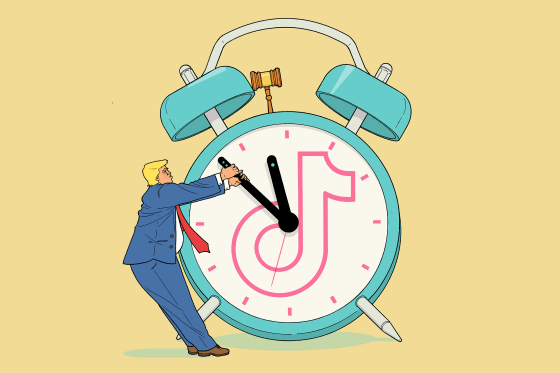
It appears like there aren’t many options for TikTok’s future in the United States after its attorneys came before the Supreme Court on Friday and were met with skepticism.
TikTok will shut down on January 19, the day before Donald Trump takes office, if the Supreme Court upholds the law that President Joe Biden signed in April. According to the law, TikTok must sell to a U.S. business and remove its Chinese ownership. TikTok can remain in business as it is for its 170 million American users, or over half of the country’s population, even if the court rule that the law is unconstitutional.
However, that prospect was called into question by the course of Friday’s oral arguments.
Other decisions could be influenced by a few circumstances. The Supreme Court may decide to postpone its final ruling in response to TikTok’s request to prolong the decision’s deadline. In support of TikTok, Trump filed an amicus brief with the Supreme Court in December, arguing for an extension that would extend the sale deadline into his presidency. He claimed that an extension would enable his administration, which is split on TikTok, to work toward a political solution for the app’s survival.
It’s unclear exactly what shape that might take.
One of Trump’s choices would be to give TikTok a 90-day extension to keep looking for an American buyer, with a clause in the bill clearly requiring a sale. However, ByteDance, the Chinese parent firm of TikTok, stated that it will not permit the app to be sold. U.S. buyers, including billionaire businessman Frank McCourt, are eager to buy TikTok if ByteDance approves a deal.
Cornell University law professor Gautam Hans said TikTok had a difficult time in the Supreme Court and that he doesn’t think the judges will support the app. “It’s unclear how Trump will seek a political resolution, with a few unlikely possibilities,” he said, referring to Trump’s brief as unprecedented.
Hans suggested that he could exert pressure on Congress to repeal the bill. Considering that the bill was passed by a partisan majority, that would be somewhat exceptional. Legislators would need to reverse the statute numerous times.
According to Hans, Trump may also order the Justice Department to refrain from enforcing the law, which would mean that it would not bring charges against Apple’s and Google’s app shops for hosting the software. However, Hans didn’t believe that based just on Trump’s word, the legal representatives for any corporation would feel free to break the law.
In her argument, Solicitor General Elizabeth Prelogar, who represented the U.S. government’s stance on TikTok before the Supreme Court, stated that she thinks ByteDance may decide to sell the business if the legislation is maintained.
In court on Friday, Prelogar stated, “I believe Congress anticipates that we may witness something akin to a game of chicken, with ByteDance stating that we cannot do it and China will never allow us to do it.” However, when the time comes and these limitations are put into place, I believe they will drastically alter ByteDance’s considerations, and they may be the catalyst Congress anticipated the business would require to proceed with the sale process.
If TikTok is left with no other choice, bidders like McCourt are placing bets that the firm will ultimately choose to sell to a U.S. owner, according to Rita McGrath, academic director in executive education at Columbia Business School.
“I think it opens up a second tier of bargaining possibilities if they do get shut down, which seems likely,” McGrath said. Since the legislation was passed until these court proceedings, TikTok has had the time to not look into buyers, their options, or any potential legal remedies. They have been engaging in a charm offensive and lobbying. For them, this is somewhat of a Hail Mary.
McGrath stated that she thinks creators will be able to switch to other platforms regardless of TikTok’s success. If TikTok goes away, platforms like Meta (with Instagram Reels) and Google (with YouTube Shorts) will have an advantage in the short-form video market. However, McGrath stated that those who have amassed sizable, lucrative, and powerful TikTok followings would suffer a loss.
Here, users have genuine interests. They use the platform for discussion, content sharing, communication, and revenue generation. According to Hans, closing this will have significant social, political, and financial repercussions for everybody involved, not just the business. The rights and interests of users—which are crucial considering that there are more than 170 million of them in this nation who will be impacted in ways that are difficult to resolve—are what I believe will be the most difficult aspect of the First Amendment.
